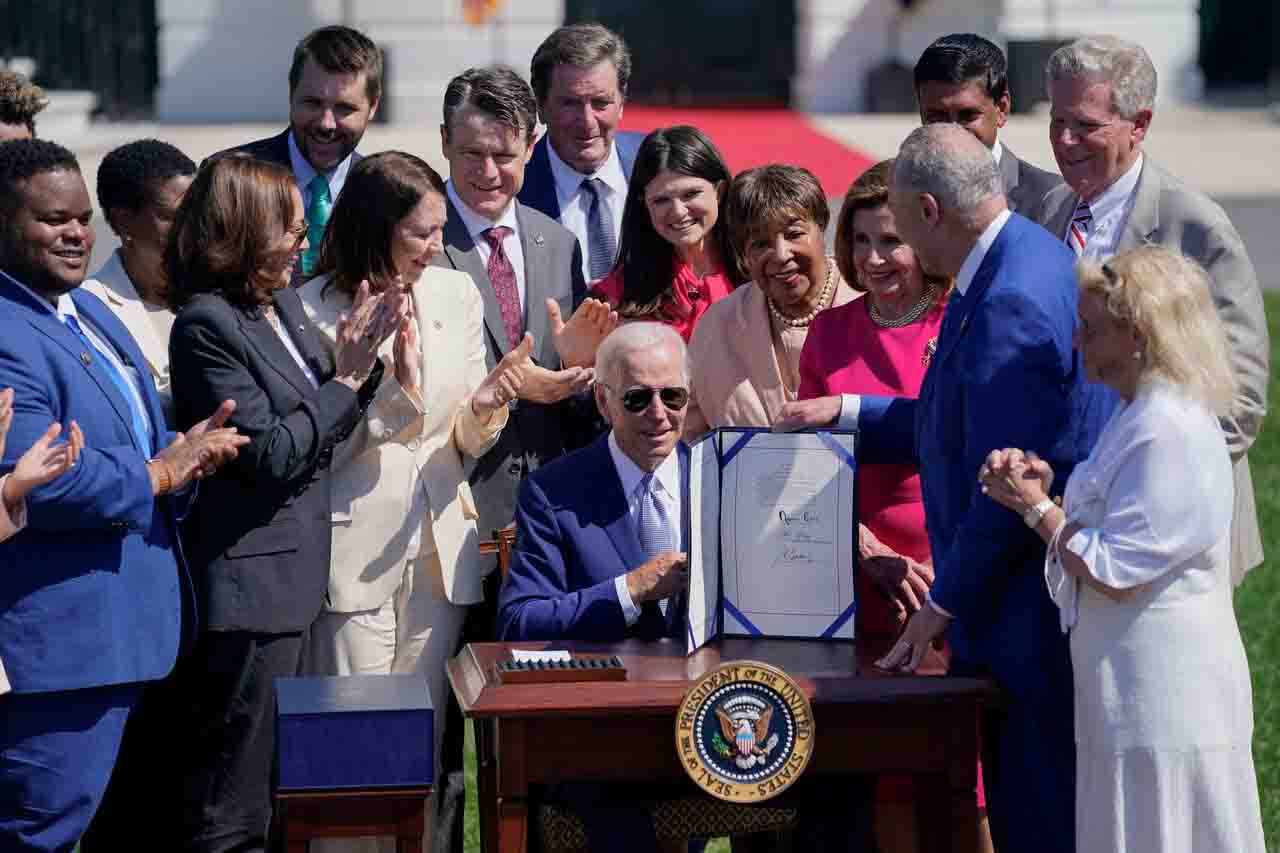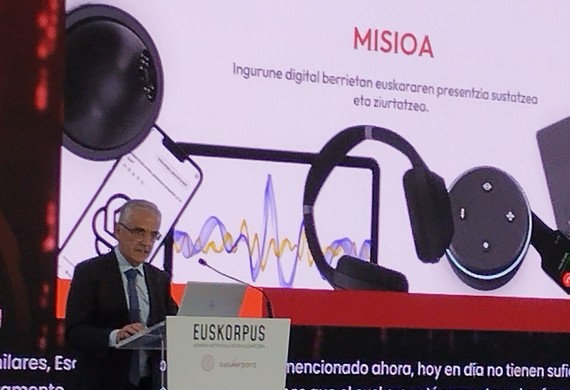Cold Chip War Begins: The U.S.-China Technology Divide
- Apple's confinements and protests at its gigantic workplace in China are not isolated cases of geopolitical context. In the technological field there is a cold war between EE.UU. and China, with the difference of where microprocessors are designed and manufactured, which now have the same importance as steel and aluminum had in World War II.

In the China region of Henan there is a city called Zhengzhou, which currently has 7 million inhabitants, twice as many as in the Basque Country. Although it has a millennial culture, today it's better known as the iPhone City. The U.S. company Apple rides its successful mobiles at its giant factory 30 kilometers away, for which 300,000 workers work day and night. Over these weeks there has been news of an avalanche of protests against Chinese government policies to prevent COVID-19 contamination. The conflict has highlighted the conditions of slavery suffered by workers.
About 85% of Apple iPhone mobile phones are produced in Zhenghou. The factory is owned by the company Taiwango Foxconn, which supplies the steel company. In September, with the proliferation of coronavirus cases, he established a "closed circuit", that is, the workers could not leave the buildings to go home. On social networks, one could see in the videos their poor state, with no place to sleep or food or medicine. The decision to make thousands of people famous from the factory led to huge clashes with white divers police across the fence. On 11 December, after 56 days of confinement, the measure was suspended.
The "closed circuit" system premiered in China by the multinational Tesla, but Westerners have come to the screens for the clashes of the Zhengzhou plant. Despite Foxconk's argument of avoiding cases of contagion, what really threatened was that the iPhone 14 didn't arrive in time for the Christmas campaign. According to some analysts, Apple will lose 40% of the income of that time: "Apple is a decline with epic proportions," explains Guardian journalist Martin Farrer, data research expert, Dan Ives: "The Chinese supply chain is a Grinch that has stolen us from Christmas."

The Chinese Government has ended up slightly relaxing COVID-19 policy in major industrial centres, but Farrer says that going from country to foreign technology companies is a matter of time. Apple itself has already shown its intention to flee and deploy in countries like India. On the contrary, is the hunger of the multinationals behind it? A number of decisions recently taken by the US administration suggest that the issue is much thicker.
"World War was declared on 7 October. There have been no reports that talk about it, but we will all have to bear the consequences." This was written by journalist Marco D'Eramo on the blog of New Left Review, in his article entitled "Circuits of War". On that day, Joe Biden's government imposed on American companies the export of integrated circuits, known as chips, to China. And not only that, but it also prohibited the export of machines used to "integrate" their designs and chips.
He knows what the veteran Italian journalist is talking about when he refers to "war." Co-founder of Il manifesto Communist newspaper and correspondent of La Repubblica, D'Eramo has the ability to look long term. He says that Washington's goal is to curb China's economic development: "It's an economic war action."
Cut wings to China
Almost everything that comes out of China's factories has a semiconductor chip, whether it's a mobile phone, a car or a microwave. But the most significant fact is that although the Asian giant consumes 70 percent of the world's chips, it only produces 15 percent of the chips it produces, none of them are state-of-the-art.
Since they began manufacturing the first processors in 1960, their size has been decreasing exponentially, and today we are able to make 3nm chips – smaller than a virus, as we told them in number 2,758 of ARGIA – but that has its limitations and challenges, among others, that extremely expensive infrastructures are needed: "Production is totally intensive in capital," says D'Eramo.
The financial concentration and geographical dispersion of the Shipyan industry can lead to the success of the Biden government’s ban on exporting these devices and design to China
There are only two companies in the world that generate these kinds of sophisticated chips, Samsung from South Korea and TSMC from Taiwan. In addition, the Dutch ASM manufactures machines that "print" these chips. The United States has a monopoly on chip design. According to the journalist, this concentration and geographical financial dispersion can lead to the success of the Biden government ban. In fact, almost the entire market chain is found in the "vasallos" countries of EE.UU. : according to D'Eramo "technological autarky is impossible in this sector".
He hasn't drawn all of these conclusions on his own, but from the book Chip War by American professor Chris Miller. Because in the Second World War there was steel or aluminum, and in the Cold War, atomic weapons are the key for Miller in the current competition between the US and China.
Already in the 1990 Gulf War, the ability of microchips to drive missiles was seen, and now, in Ukraine, we are seeing the "inability of Russia to integrate into the systems" of these advanced chips, says the historian Protocol.com in an interview with the digital portal. He says that what matters in the military sphere is "integration," that is, the ability to transmit information between microchips: "And that can only be done by the most advanced semiconductor chips."

Seeing that only China has the centre – and the intention – to develop this military technology that requires billions of euros of investment, Washington wants to cut its wings, with bans such as that of 7 October. At the same time, it seeks to deglobalize the microchip market and move production to the United States, such as Texas, with large reserves of public money ($280,000 million), through the recently approved Chip Act.
In the interview Miller is asked EE.UU. and China if this "technological distribution" is desirable, as it increases the possibility of an open war, the economic cost of which would be lower. He replies that with this thesis he is "skeptical": "Precisely the subject that brought us the year 2022 is that the very economically linked powers can quickly be detached, we have seen it in a shocking way between Russia and Europe." So, maybe 2023 will tell us if the title bearing this article will also have to remove the adjective "cold".
Last week, during the blackout, seeing ourselves vulnerable, we began to investigate many people in order to understand what happened: how does the infrastructure that transports electricity work? Why is it getting old? I am fascinated by the physical phenomenon of electricity... [+]
Automatizazioaren eta abereen inguruan kuxkuxeatzen ari nintzela, ukuilu automatizatuen informazioa hasi naiz eskuratzen. Nire idazmahaiaren erosotasunetik idazten, gizakion kontsumorako modu masiboan esplotatzen ditugun abereen bizitzak nahiko penagarriak direla iruditzen zait,... [+]
Nortasuna Sarean jardunaldien 10. edizioa egingo dute asteazken honetan Donostiako San Telmon, KomunikaziONA bideguruatzean izenburupean. Egungo komunikazio joerak aztertu eta "alternatiba osasuntsuagoak" topatzen saiatuko dira. Hainbat hizlari gonbidatu dituzte, euren... [+]
Orain dela 20 bat urte, berrikuntzaren inguruan master bat egin nuen. Bertaraturiko gonbidatu batek esan zigun gizakion historian berrikuntza teknologikoaren eragile handiena gerra izan zela. Gerra, halaber, eragile handia da botere harremanen berrikuntzan.
Berrikuntzaz ari... [+]
Aspaldi pertsona oso zatar bat ezagutu nuen, urrun izatea komeni den pertsona horietako bat. Bere genero bereko pertsonengana zuzentzeko, gizonezkoengana, “bro” hitza erabili ohi zuen. Edozein zapaltzeko prest zegoen, bere helburuak lortzeko. Garai hartatik hitz... [+]
Sare sozialetan badira zenbait pertsona eragin gaitasun handikoak. Jarraitzaile ugari dute, eta euren iritziak egiatzat hartzen dira. Askok, ordea, egia barik, interes propioa edo klase baten interesak iraunkortzea bilatzen dute. Ameriketan komentokrata deitzen zaie. Alegia,... [+]
Iragana ulertzen saiatzen eta etorkizuna bideratzen, oraina joaten zaigu zenbaiti. Nire proiektuetako bat (hasi baina landu ez dudana oraindik) dudan zuhaitz genealogikoa egitea da. Horretan lagunduko didan liburutxo bat ere erosi nuen. Baina, hain da handia lana, liburutxoa... [+]
Ortutik itzuli berritan erabaki nuen Twitterretik alde egitea, oraindik Twitter zenean. Auzolan batera joan nintzen, brokoliak eta azaloreak landatzera, eta mindfulness efektua zapuztu zidan algoritmoak, idazle feminista transgorrotatzaile baten txioak jaurtitzearekin... [+]
Ikerketa bat egin dute Alemanian, hauteskundeen atarian: kontuak sortu dituzte TikToken, X-n eta Instagramen, eta aztertu egin dute algoritmoak zer nolako edukiak erakusten dituen. Guztietan, algoritmoak eskuinera eta eskuin muturrera jotzen du gehien, TikToken nabarmen.
Euskorpora elkartearen eta Euskorpus proiektuaren abiatzeak hautsak harrotu ditu. Pello Otxandiano EH Bilduko Eusko Legebiltzarreko oposizio buruak Euskorpusena akatsa dela uste du, "ezjakintasuna edo estrategia klientelarra". EH Bilduk galdera sorta egin du... [+]


















